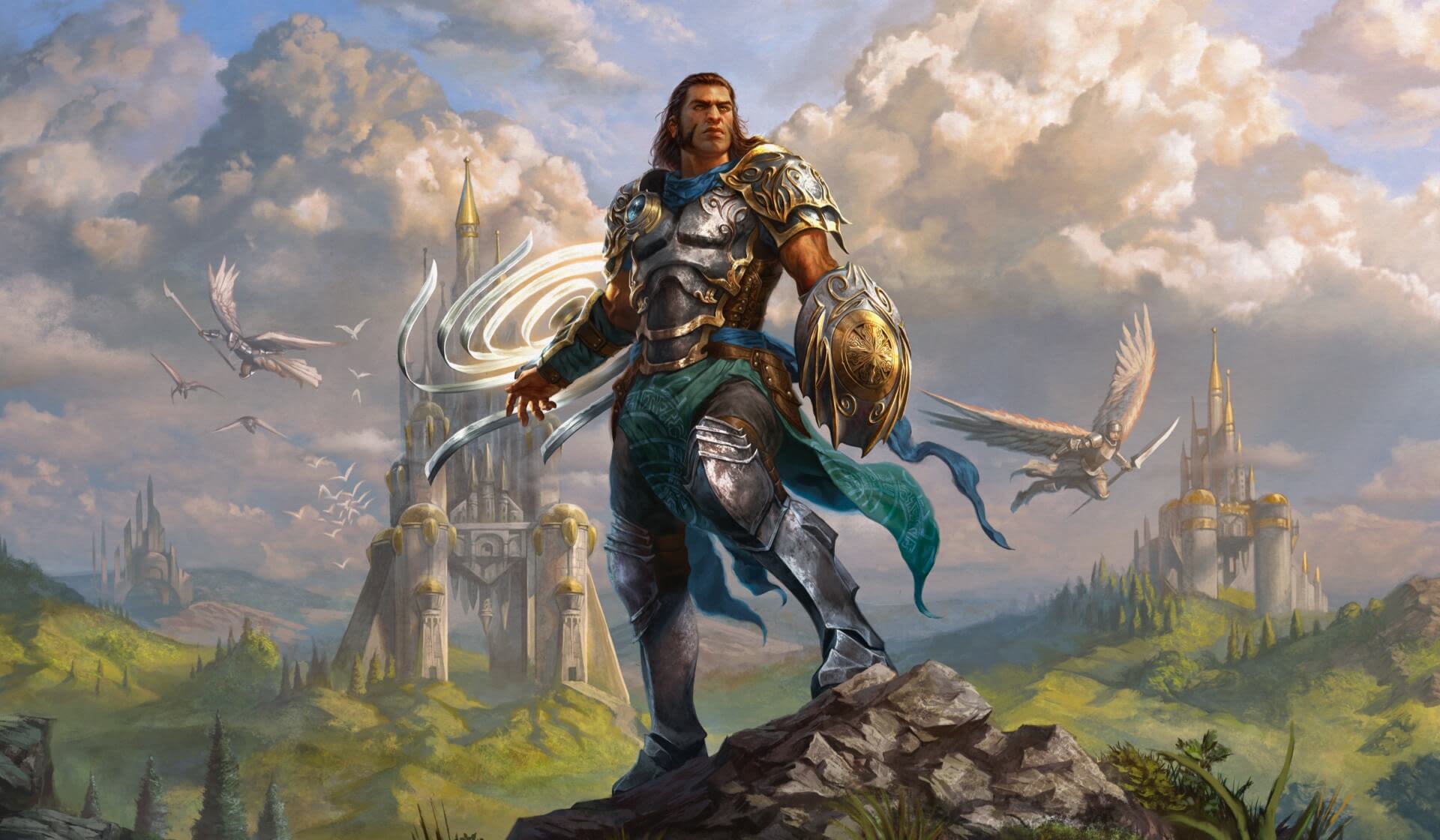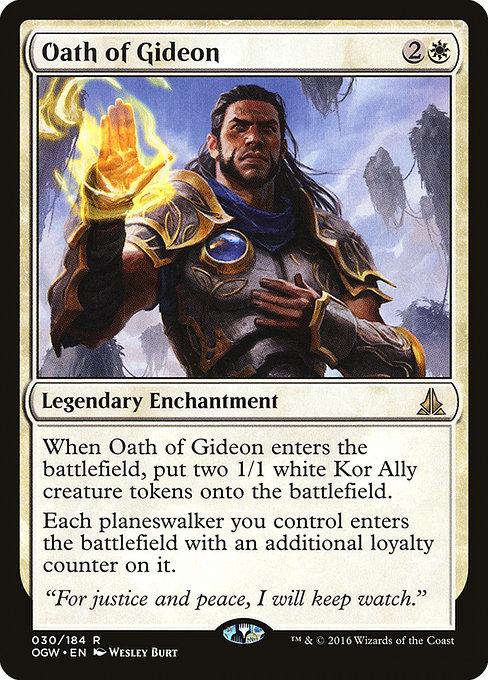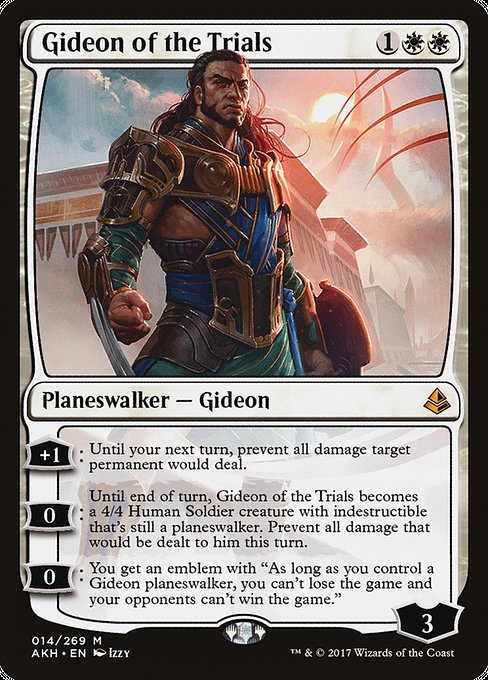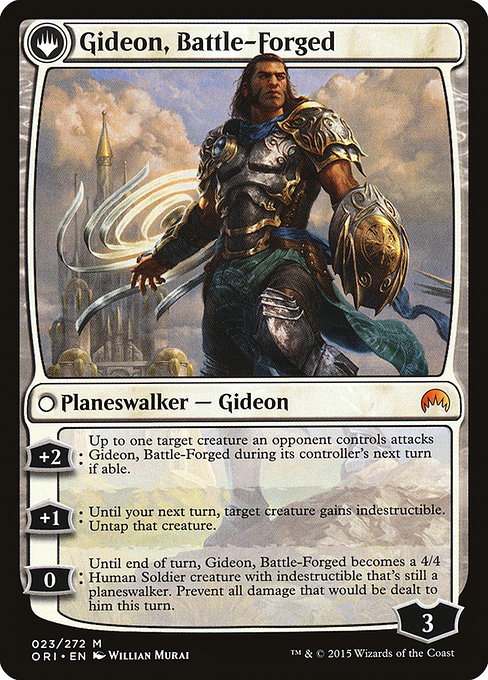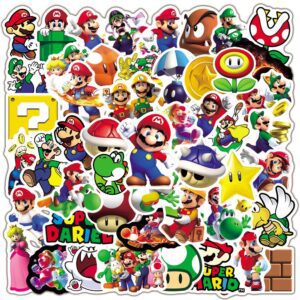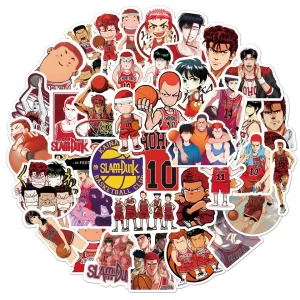As a survivor of abuse, I’ve often found solace in the magical world of “Magic: The Gathering.” The game’s “color pie” encompasses the full range of human experiences and emotions, from triumph to sorrow, from love to trauma. In this last category, I find myself drawn to one character in particular: Gideon Jura.
What resonates with me about Gideon isn’t so much his past as the strength he shows in the face of it. Like me, Gideon knows what it’s like to be let down by those who are supposed to protect him. And like me, he carries a heavy burden of guilt and self-blame.
Gideon’s world falls apart when he fails to protect his friends from a titan sent by the Death God Erebos. He feels guilty, hopeless, and powerless. I know those feelings well. I’ve asked myself why I didn’t fight back, why I didn’t ask for help, why I couldn’t protect the things I cared about. And like Gideon, I have a harsh inner judge that tells me I could have done more, that I should have been better, that I will not be worthy until I am the best.
But as I’ve learned, trying to be invulnerable and relying only on myself is not the path to healing. It may seem like the only option, but it can lead to unhealthy decisions and behaviors. Gideon comes to a similar realization. He may have lost faith in the gods who were supposed to protect him, but he learns that he can’t go it alone. He needs his friends, his allies, and his community to help him make a difference in the world.
Gideon’s desire to do good by others, even in the face of his own trauma, is what inspires me the most. It’s not easy to be kind and compassionate when exposed to the worst the world has to offer. But it’s possible. Gideon’s journey to adulthood shows that it’s possible to overcome the pain of the past and positively impact the present. And that’s a lesson that I try to take to heart every day.
Gideon of the Trials
Living with trauma can be a lonely and isolating experience. For years, I thought I could handle everything on my own, that asking for help was a sign of weakness. I wanted to prove my own strength and resolve, to show the world that I could handle anything that came my way. But the truth was, I was struggling, and I didn’t know how to ask for help.
Gideon Jura faced a similar struggle. Steeped in guilt and self-blame, he became obsessed with saving the innocent by fighting wars on two planes: Zendikar and Ravnica. He barely attended to his wounds and never asked for help. It wasn’t until he realized he couldn’t solve a problem alone that he was forced to seek outside help. When he realized the leylines of Zendikar were beyond him, he finally reached out to Jace, and that set off a chain of events that culminated in a group of Planeswalkers coming together to save Zendikar from the Eldrazi Titans.
For the first time in years, Gideon felt like he could be part of a team again. And that’s something I can relate to. When I was in college, I found out that my maternal grandfather had passed away. My initial reaction was fear. Fear that my mother would blame me for his death, or take out her grief on me in violent ways. Overwhelmed and feeling helpless, I decided to drop into a free therapy session held by my school’s psychology department.
At first, I felt ashamed and weak for admitting my fears out loud. But as I talked with the young man and woman in the therapy session, I began to realize that asking for help wasn’t a sign of weakness. It was a sign of strength. Like Gideon, I realized that I could rely on other people to help complement me and guide me toward a better path.
Gideon’s desire to protect others, to save them, is what inspires me the most. Despite the trauma he’s faced, he’s still committed to positively impacting the world. And he’s learned that he can’t do it alone. He needs his friends, allies, and community to help him make a difference.
Living with trauma can be a long and difficult journey. But it’s a journey that’s made easier when we have people to turn to who can help us shoulder the burden. Asking for help isn’t a sign of weakness. It’s a sign of strength, of resilience, of the determination to keep going, no matter what.
Healing and a Path of Growth
I used to think that the revelations I made about myself during therapy were set in stone. I accepted that I had been abused and thought I understood how it had left an indelible imprint on my psyche. But then something happened that made me reconsider just how deeply those marks were made.
Gideon also thought he understood the rules of his inner and external worlds until he arrived on Amonkhet. This plane was different, and the gods here were not like those on Theros. As someone who had come to accept the presence of the divine in his life, meeting the mono-white cat god Oketra shook him to his core. Her divinity was not veiled, and Gideon could feel it in every nerve.
For a long time, I thought I could handle my problems alone to prove my strength and resolve. But like Gideon, I eventually realized I could rely on others to complement me and help me reach my goals. For Gideon, it was about keeping the Multiverse safe from giant monsters and bringing order and safety to all. For me, it was about becoming a more whole individual – someone strong enough to take care of those around me.
However, like Gideon, I made the mistake of assuming I knew everything about myself. I believed I was strong enough to help my friend through everything, but I eventually realized that I was trying to take care of them like I’d cared for my abusive parents. People seldom change for others; they have to decide to change for themselves.
I ended up letting go of my friend. Our relationship had become toxic, and I knew that holding onto them would only damage me and stunt my personal growth. Gideon also understood that any faith in the gods of Amonkhet would be misplaced, as Bolas corrupted the core of their being.
When overwhelmed with guilt, it becomes so tempting to surrender to that darkness. To accept that warped reality and let go. I could have accepted that my role was to sacrifice myself and everything I had to help my friends, no matter how self-destructive they were. Gideon Jura could have let himself stop feeling that responsibility and guilt. But instead, we both made the hard decision to leave and learn how to be better at fighting our demons. Or our dragons.
Final Thoughts
Gideon’s character development in the Magic lore is a journey towards self-awareness and personal growth, despite his mono-white identity’s rigidity. He was forced to confront his beliefs and re-evaluate himself after the gods he worshipped and trusted betrayed him. This process of self-reflection and change is akin to the difficult and arduous journey of healing after experiencing trauma.
Trying to understand trauma’s effects and how it has shaped one’s identity can be daunting, but it is necessary for personal growth and recovery. Gideon’s decision to become a protector and defender of others, despite his own psychological scars, is a testament to the strength and resilience of those who choose to live better lives after experiencing trauma.
Sadly, trauma is an all-too-common experience for many individuals, with a high percentage of men and women in the United States having experienced some form of trauma in their lives. This is especially true for minority communities, where the rates of trauma are even higher.
However, despite the prevalence of trauma, the ability to move forward and find the strength to heal is a precious and inspiring quality. Gideon’s story can serve as an inspiration for Magic players and individuals alike to recognize that they are not alone and that they, too can find the strength and grace to move past their past experiences and live better lives.




